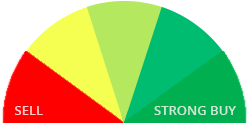THE SERVICE AND THE MATERIALS ARE PROVIDED BY DUCOVEST INC. AND OTHER INFORMATION PROVIDERS ON AN “AS IS” BASIS, AND DUCOVEST AND OTHER INFORMATION PROVIDERS EXPRESSLY DISCLAIM ANY AND ALL WARRANTIES, EXPRESS OR IMPLIED, INCLUDING, WITHOUT LIMITATION, WARRANTIES OF SATISFACTORY QUALITY AND FITNESS FOR A PARTICULAR PURPOSE, WITH RESPECT TO THE SERVICE OR ANY MATERIALS AND PRODUCTS. IN NO EVENT SHALL DUCOVEST AND OTHER INFORMATION PROVIDERS BE LIABLE FOR ANY DIRECT, INDIRECT, INCIDENTAL, PUNITIVE, OR CONSEQUENTIAL DAMAGES OF ANY KIND WHATSOEVER WITH RESPECT TO THE SERVICE, THE MATERIALS AND THE PRODUCTS
THE CONTENT ON DUCOVEST.COM IS INTENDED AS GENERAL INFORMATION AND NOT INFORMATION THAT YOU SHOULD RELY ON FOR INVESTMENT OR TRADING PURPOSES. DUCOVEST AND/OR ITS OFFICERS, DIRECTORS, EMPLOYEES, CONSULTANTS, CONTRACTORS, AGENTS AND THE LIKE (“REPRESENTATIVES”) DO NOT GIVE ANY TAX OR ANY INVESTMENT ADVICE NOR ADVOCATE THE PURCHASE OR SALE OF ANY SECURITY OR INVESTMENT. ANY REFERENCE TO PRODUCTS, SERVICES, AND THE LIKE ON OR THROUGH WWW.DUCOVEST.COM, INCLUDING WITHOUT LIMITATION ANY SITE CONTENT, APPLICATIONS AND/OR SERVICES, DOES NOT CONSTITUE NOR IMPLY ANY RECOMMENDATION OR ENDORSEMENT THEREOF OR ANY AFFILIATION WITH DUCOVEST INC. AND/OR ITS REPRESENTATIVES.
NONE OF THE SITE CONTENT CONSTITUTES AN:
- OFFER TO SELL OR THE SOLICITATION OF AN OFFER TO BUY BY DUCOVEST INC. AND/OR ITS REPRESENTATIVES ANY SECURITY OR OTHER INVESTMENT;
- OFFER BY DUCOVEST INC. AND/OR ITS REPRESENTATIVES TO PROVIDE INVESTMENT SERVICES OF ANY KIND; AND/OR
- INVITATION, INDUCEMENT OR ENCOURAGEMENT BY DUCOVEST INC. AND/OR ITS REPRESENTATIVES TO ANY PERSON TO MAKE ANY KIND OF INVESTMENT DECISION.
SECURITIES OR OTHER INVESTMENTS REFERRED TO IN ANY SITE CONTENT MAY NOT BE SUITABLE FOR YOU AND YOU SHOULD NOT MAKE ANY KIND OF INVESTMENT DECISION IN RELATION TO THEM WITHOUT FIRST OBTAINING INDEPENDENT INVESTMENT ADVICE FROM A PERSON AUTHORISED TO GIVE IT. FROM TIME TO TIME, DUCOVEST AND ITS REPRESENTATIVES, INCLUDING WITHOUT LIMITATION PERSONS INVOLVED IN THE PREPARATION OF WWW.DUCOVEST.COM’S CONTENT, MAY HAVE LONG OR SHORT POSITIONS IN, AND BUY AND SELL THE SECURITIES OR DERIVATIVES (INCLUDING OPTIONS) OF COMPANIES MENTIONED IN SITE CONTENT.
DUCOVEST.COM IS NOT DIRECTED AT PERSONS WHO ARE RESIDENTS OF ANY COUNTRY WHERE DISSEMINATION OF ANY OF THE INFORMATION CONTAINED ON OUR WEBSITE IS NOT PERMITTED.
Beta
www.ducovest.com is currently in Beta. This means that any of the content and analysis available on the site may be incorrect or erroneous. We encourage users to flag any issues and make us aware through info@ducovest.com
Content Provided by QuoteMedia
In addition to the areas covered in the ducovest “Disclaimer” and all parts therein, portions of the data provided on our site is provided by and subject to the Conditions of Use as set out by QuoteMedia and available to view online at http://www.quotemedia.com/legal/tos.php
Intellectual Property
ducovest.com and the ducovest.com logo are owned by Ducovest Inc.
We ask our users to respects our rights (including the intellectual property rights). We may, in appropriate circumstances and at our sole discretion, terminate the accounts of users that infringe or otherwise violate such rights of others.
Unsubscribe Policy
Members may unsubscribe to any of communications from Ducovest Inc. by following the instructions contained at the end of every email we send to you.
Terms of Use
By accessing or using any information, data, content, views, opinions, recommendations, photos, messages, notes, text, ideas, concepts, claims, statements, video, music, advertising, listing, works of authorship and/or any other information, materials and the like (collectively, the “Site Content”) and/or any tools, applications and the like (collectively, the “Applications”) contained on, distributed through and/or linked, downloaded or accessed from any of the services contained on www.ducovest.com (collectively, the “Services”), you signify that you have read, understand and agree to be bound by these Terms of Use, ducovest’s Privacy Policy and any other general rules, practices, policies, limits and/or restrictions applicable to your use of www.ducovest.com, including without limitation any Site Content, Applications and/or Services (collectively, the “Agreement”).
Ducovest Inc. reserves the right, at it’s sole discretion and at any time, to change, modify, add or delete portions of the Agreement without further notice. Any such revised Agreement will be posted on www.ducoivest.com and the date at the top of the page will indicate the date when the Agreement was last revised. Your use of www.ducovest.com, after any such revision constitutes your acceptance of the revised Agreement. If you do not agree to the current or any future revised Agreement, do not access and use (or continue to access and use) www.ducovest.com, including without limitation any Site Content, Applications and/or Services. Because of this, it is important that you regularly check the Agreement to determine if there have been any revisions to the Agreement.
Use of data available on www.ducovest.com
www.ducovest.com uses end of day data provided by QuoteMedia and other suppliers. Ducovest Inc. takes no responsibility for the availability, timeliness, reliability, accuracy, integrity, security, usefulness and/or quality of any such Site Content supplied by Users and/or Information Providers nor for any investment decisions that you might make based on such Site Content. You should always use caution and common sense in using any information available on www.ducovest.com , including without limitation any Site Content, Applications and/or Services, and obtain independent investment advice from persons authorized to give it, before investing.
Prohibited user conduct
You will not and will not permit any third party to:
- copy, upload or republish any Site Content (other than your User Content as defined elsewhere in the Agreement), Applications and/or Services, or any portion thereof, onto any Internet, Intranet or Extranet site and/or incorporate any of the same into any other database or compilation;
- copy, upload or republish any Site Content, Applications and/or Services, or any portion thereof, for use with any information retrieval and/or provision service;
- except to the extent you download and print permitted and authorized Site Content to which you have properly gained access and/or access and use any permitted and authorized Applications and/or Services to which you have properly gained access, solely and strictly for your permitted personal and non-commercial use hereunder and except for your own content), copy, modify, reproduce, distribute, frame, transmit, download, upload, disseminate, process, publish, license, sell, create derivative works from, provide any third party with access to, transfer, assign, sell and/or exploit for any commercial purpose any of the Site Content, Applications and/or Services, or any portion thereof, obtained or accessed from www.ducovest.com;
- harvest or collect e-mail addresses, contact or other personal information of other Users by electronic or other means for the purposes of sending unsolicited emails or other unsolicited communications;
- use www.ducovest.com, including without limitation any Site Content, Applications and/or Services, in any unlawful manner and/or with any device, software, routine or in any other manner that could:
- interfere with the proper working of, damage, disable, overburden or impair www.ducovest.com, including without limitation any Site Content, Applications and/or Services,
- restrict or inhibit any other person from accessing, using or enjoying www.ducovest.com, including without limitation any Site Content, Applications and/or Services;
- impose an unreasonable or disproportionately large load on www.ducovest.com’s infrastructure; and/or
- expose www.ducovest.com, Its Representatives, its licensors, its Information Providers, its distribution partners and/or its Users to any harm or liability of any type;
- use any automated scripts, automated query systems, data mining, robots or similar data gathering or extraction methods to collect information from or otherwise interact with www.ducovest.com, including without limitation any Site Content, Applications and/or Services. Any such use is strictly prohibited and will result in immediate termination of your access and use of www.ducovest.com
- intentionally or unintentionally encourage or provide instructions for a criminal offense, violate the rights of any party, and/or otherwise create liability or violate any applicable local, state, provincial, national or international law, including without limitation any applicable securities and/or export control laws;
- post on or through www.ducovest.com, including without limitation any Site Content, Applications and/or Services, any of Your Information, including without limitation User Content (as defined elsewhere in the Agreement), that is or that Ducovest Inc. deems to be false, misleading, unlawful, promoting unlawful or criminal activities, harmful, threatening, defamatory, libelous, infringing, abusive, inflammatory, harassing, vulgar, obscene, fraudulent, invasive of privacy or publicity rights, sexually exploitive, hateful and/or racially, ethnically or otherwise objectionable;
- register for more than one user account, register for a user account on behalf of an individual other than yourself, register for a user account on behalf of any group or entity, use or attempt to use another’s account, service or system without prior written authorization from Ducovest Inc. and/or create a false identity on or through www.ducovest.com, including without limitation any Site Content, Applications and/or Services;
- impersonate any person or entity, use a false name or falsely state or otherwise misrepresent yourself, your age or your affiliation with any person or entity;
- post on or through ducovest.com , including without limitation any Site Content, Applications and/or Services, any unsolicited or unauthorized advertising, solicitations, promotional materials, “junk mail,” “spam,” “chain letters,” “pyramid schemes,” or any other form of solicitation;
- post on or through www.ducovest.com, including without limitation any Site Content, Applications and/or Services, any private information of any third party, including, without limitation, addresses, phone numbers, email addresses, Social Security, Social Insurance or equivalent numbers and/or credit card numbers;
- solicit personal information from anyone or solicit passwords or personally identifying information for commercial or unlawful purposes;
- post on or through www.ducovest.com, including without limitation any Site Content, Applications and/or Services, any material that contains software viruses or any other computer code, files or programs designed to interrupt, destroy or limit the functionality of any computer software or hardware or telecommunications equipment; and
- intimidate or harass another.
Please direct any questions or concerns regarding the Agreement to info@ducovest.com








